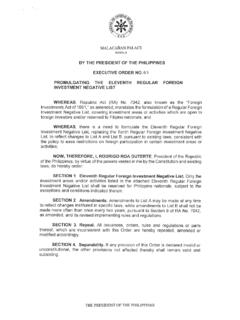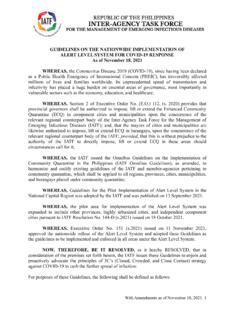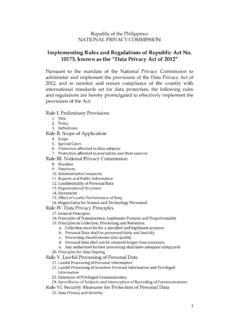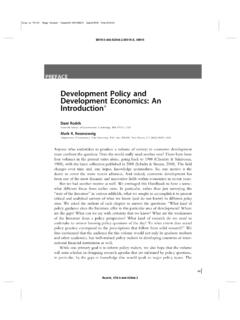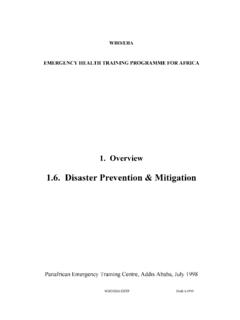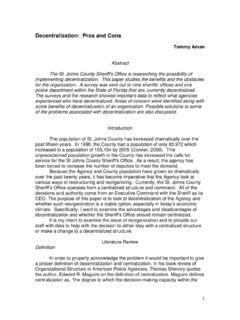Transcription of THE LOCAL GOVERNMENT CODE OF THE PHILIPPINES
1 THE LOCAL GOVERNMENT code OF THE PHILIPPINES BOOK I GENERAL PROVISIONS TITLE ONE. - BASIC PRINCIPLES CHAPTER 1. - THE code , POLICY AND APPLICATION SECTION 1. Title. - This Act shall be known and cited as the " LOCAL GOVERNMENT code of 1991". SECTION 2. Declaration of Policy. - (a) It is hereby declared the policy of the State that the territorial and political subdivisions of the State shall enjoy genuine and meaningful LOCAL autonomy to enable them to attain their fullest development as self-reliant communities and make them more effective partners in the attainment of national goals. Toward this end, the State shall provide for a more responsive and accountable LOCAL GOVERNMENT structure instituted through a system of decentralization whereby LOCAL GOVERNMENT units shall be given more powers, authority, responsibilities, and resources.
2 The process of decentralization shall proceed from the national GOVERNMENT to the LOCAL GOVERNMENT units. (b) It is also the policy of the State to ensure the accountability of LOCAL GOVERNMENT units through the institution of effective mechanisms of recall, initiative and referendum. (c) It is likewise the policy of the State to require all national agencies and offices to conduct periodic consultations with appropriate LOCAL GOVERNMENT units, non-governmental and people's organizations, and other concerned sectors of the community before any project or program is implemented in their respective jurisdictions. SECTION 3. Operative Principles of decentralization . - The formulation and implementation of policies and measures on LOCAL autonomy shall be guided by the following operative principles: (a) There shall be an effective allocation among the different LOCAL GOVERNMENT units of their respective powers, functions, responsibilities, and resources; (b) There shall be established in every LOCAL GOVERNMENT unit an accountable, efficient, and dynamic organizational structure and operating mechanism that will meet the priority needs and service requirements of its communities.
3 1 (c) Subject to civil service law, rules and regulations, LOCAL officials and employees paid wholly or mainly from LOCAL funds shall be appointed or removed, according to merit and fitness, by the appropriate appointing authority; (d) The vesting of duty, responsibility, and accountability in LOCAL GOVERNMENT units shall be accompanied with provision for reasonably adequate resources to discharge their powers and effectively carry out their functions; hence, they shall have the power to create and broaden their own sources of revenue and the right to a just share in national taxes and an equitable share in the proceeds of the utilization and development of the national wealth within their respective areas; (e) Provinces with respect to component cities and municipalities, and cities and municipalities with respect to component Barangays, shall ensure that the acts of their component units are within the scope of their prescribed powers and functions: (f) LOCAL GOVERNMENT units may group themselves, consolidate or coordinate their efforts, services, and resources for purposes commonly beneficial to them; (g) The capabilities of LOCAL GOVERNMENT units ,especially the municipalities and Barangays, shall been enhanced by providing them with opportunities to participate actively in the implementation of national programs and projects.
4 (h) There shall be a continuing mechanism to enhance LOCAL autonomy not only by legislative enabling acts but also by administrative and organizational reforms; (i) LOCAL GOVERNMENT units shall share with the national GOVERNMENT the responsibility in the management and maintenance of ecological balance within their territorial jurisdiction, subject to the provisions of this code and national policies; (j) Effective mechanisms for ensuring the accountability of LOCAL GOVERNMENT units to their respective constituents shall be strengthened in order to upgrade continually the quality of LOCAL leadership; (k) The realization of LOCAL autonomy shall be facilitated through improved coordination of national GOVERNMENT policies and 2 programs and extension of adequate technical and material assistance to less developed and deserving LOCAL GOVERNMENT units; (l) The participation of the private sector in LOCAL governance, particularly in the delivery of basic services, shall be encouraged to ensure the viability of LOCAL autonomy as an alternative strategy for sustainable development; and (m) The national GOVERNMENT shall ensure that decentralization tributes to the continuing improvement of the performance of LOCAL GOVERNMENT units and the quality of community life.
5 SECTION 4. Scope of Application. - This code shall apply to all provinces, cities, municipalities, Barangays, and other political subdivisions as may be created by law, and, to the extent herein provided, to officials, offices, or agencies of the national GOVERNMENT . SECTION 5. Rules of Interpretation. - In the interpretation of the provisions of this code , the following rules shall apply: (a) Any provision on a power of a LOCAL GOVERNMENT unit shall be liberally interpreted in its favor, and in case of doubt, any question thereon shall be resolved in favor of devolution of powers and of the lower LOCAL GOVERNMENT unit. Any fair and reasonable doubt as to the existence of the power shall be interpreted in favor of the LOCAL GOVERNMENT unit concerned; (b) In case of doubt, any tax ordinance or revenue measure shall be construed strictly against the LOCAL GOVERNMENT unit enacting it, and liberally in favor of the taxpayer.
6 Any tax exemption, incentive or relief granted by any LOCAL GOVERNMENT unit pursuant to the provisions of this code shall be construed strictly against the person claiming it. (c) The general welfare provisions in this code shall be liberally interpreted to give more powers to LOCAL GOVERNMENT units in accelerating economic development and upgrading the quality of life for the people in the community; (d) Rights and obligations existing on the date of effectivity of this code and arising out of contracts or any other source of prestation involving a LOCAL GOVERNMENT unit shall be governed by the original terms and conditions of said contracts or the law in force at the time such rights were vested; and 3 (e) In the resolution of controversies arising under this code where no legal provision or jurisprudence applies, resort may be had to the customs and traditions in the place where the controversies take place.
7 CHAPTER 2. - GENERAL POWERS AND ATTRIBUTES OF LOCAL GOVERNMENT UNITS SECTION 6. Authority to Create LOCAL GOVERNMENT Units. - A LOCAL GOVERNMENT unit may be created, divided, merged, abolished, or its boundaries substantially altered either by law enacted by Congress in the case of a province, city, municipality, or any other political subdivision, or by ordinance passed by the Sangguniang Panlalawigan or Sangguniang Panlungsod concerned in the case of a Barangay located within its territorial jurisdiction, subject to such limitations and requirements prescribed in this code . SECTION 7. Creation and Conversion. - As a general rule, the creation of a LOCAL GOVERNMENT unit or its conversion from one level to another level shall be based on verifiable indicators of viability and projected capacity to provide services, to wit: (a) Income.
8 - It must be sufficient, based on acceptable standards, to provide for all essential GOVERNMENT facilities and services and special functions commensurate with the size of its population, as expected of the LOCAL GOVERNMENT unit concerned; (b) Population. - It shall be determined as the total number of inhabitants within the territorial jurisdiction of the LOCAL GOVERNMENT unit concerned; and (c) Land Area. - It must be contiguous, unless it comprises two or more islands or is separated by a LOCAL GOVERNMENT unit independent of the others; properly identified by metes and bounds with technical descriptions; and sufficient to provide for such basic services and facilities to meet the requirements of its populace.
9 Compliance with the foregoing indicators shall be attested to by the Department of Finance (DOF), the National Statistics Office (NSO), and the Lands Management Bureau (LMB) of the Department of Environment and Natural Resources(DENR). SECTION 8. Division and Merger. - Division and merger of existing LOCAL GOVERNMENT units shall comply with the same requirements herein prescribed for their creation: Provided however, That such division shall not reduce the income, population, or land area of the LOCAL GOVERNMENT unit or units concerned to less than the minimum requirements prescribed 4 in this code : Provided, further, That the income classification of the original LOCAL GOVERNMENT unit or units shall not fall below its current income classification prior to such division.
10 The income classification of LOCAL GOVERNMENT units shall be updated within six (6) months from the effectivity of this code to reflect the changes in their financial position resulting from the increased revenues as provided herein. SECTION 9. Abolition of LOCAL GOVERNMENT Units. - A LOCAL GOVERNMENT unit may be abolished when its income, population, or land area has been irreversibly reduced to less than the minimum standards prescribed for its creation under Book III of this code , as certified by the national agencies mentioned in Section 17 hereof to Congress or to the Sanggunian concerned, as the case may be. The law or ordinance abolishing a LOCAL GOVERNMENT unit shall specify the province, city, municipality, or Barangay with which the LOCAL GOVERNMENT unit sought to be abolished will be incorporated or merged.






